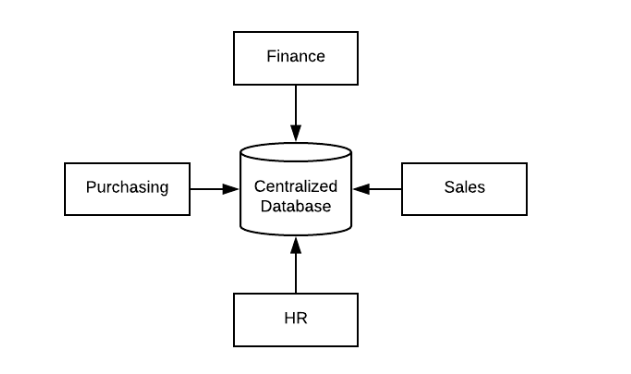
 Data Structure
Data Structure Networking
Networking RDBMS
RDBMS Operating System
Operating System Java
Java MS Excel
MS Excel iOS
iOS HTML
HTML CSS
CSS Android
Android Python
Python C Programming
C Programming C++
C++ C#
C# MongoDB
MongoDB MySQL
MySQL Javascript
Javascript PHP
PHP
- Selected Reading
- UPSC IAS Exams Notes
- Developer's Best Practices
- Questions and Answers
- Effective Resume Writing
- HR Interview Questions
- Computer Glossary
- Who is Who
Centralized Database Management System
A centralized database is stored at a single location such as a mainframe computer. It is maintained and modified from that location only and usually accessed using an internet connection such as a LAN or WAN. The centralized database is used by organisations such as colleges, companies, banks etc.
As can be seen from the above diagram, all the information for the organisation is stored in a single database. This database is known as the centralized database.
Advantages
Some advantages of Centralized Database Management System are −
- The data integrity is maximised as the whole database is stored at a single physical location. This means that it is easier to coordinate the data and it is as accurate and consistent as possible.
- The data redundancy is minimal in the centralised database. All the data is stored together and not scattered across different locations. So, it is easier to make sure there is no redundant data available.
- Since all the data is in one place, there can be stronger security measures around it. So, the centralised database is much more secure.
- Data is easily portable because it is stored at the same place.
- The centralized database is cheaper than other types of databases as it requires less power and maintenance.
- All the information in the centralized database can be easily accessed from the same location and at the same time.
Disadvantages
Some disadvantages of Centralized Database Management System are −
- Since all the data is at one location, it takes more time to search and access it. If the network is slow, this process takes even more time.
- There is a lot of data access traffic for the centralized database. This may create a bottleneck situation.
- Since all the data is at the same location, if multiple users try to access it simultaneously it creates a problem. This may reduce the efficiency of the system.
- If there are no database recovery measures in place and a system failure occurs, then all the data in the database will be destroyed.

Advertisements

